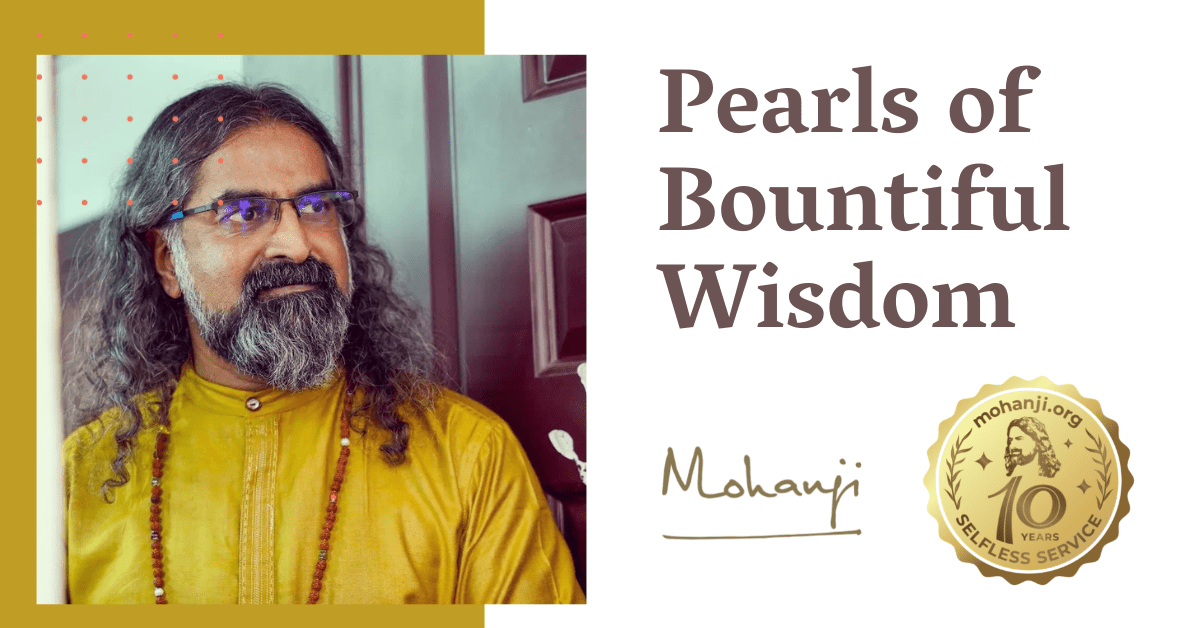Pearls of bountiful wisdom – interview on RTCG 1 TV, Montenegro | Mohanji
Be authentic, be yourself
Host: You recently completed the retreat “Find the peace within” here in Ulcinj. What happened to us as humans? How did we manage to lose inner peace so we have to seek it?
Mohanji: The simple answer is the wrong connection; we connect to what we see outside. For example, we look at society, and society considers us as something, and we accept it. We hardly look inside. Because we are unique beings, our thumb impression is unique to us.
We are born unique. We are authentic. We are original. But all the time, we’re trying to imitate something; we’re trying to compare. We’re trying to compete. So, in the bargain, what’s happening is we lost our connection. That’s the fundamental reason why we can’t really touch that space of peace. We have it inside.
The moment you start accepting yourself as an original, and you don’t worry about others’ opinions, criticisms, judgments, and comparisons, there’ll be big relief happening inside. Great freedom! That we have already. It’s not something which we can gain from anywhere. You don’t need a teacher also for this.
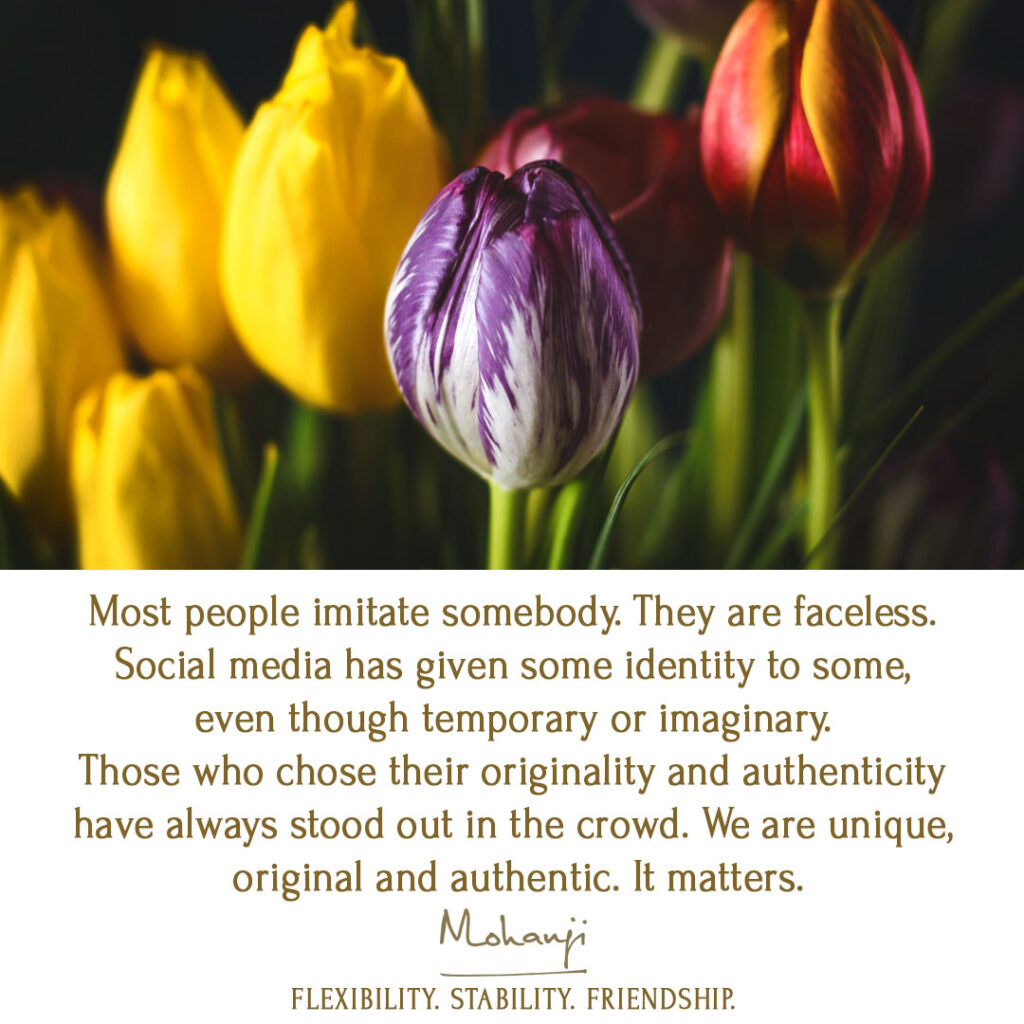
For example, in our houses, we’ve seen how small children work. I always believe they are the greatest teachers; small children are completely spontaneous. They are never worried about the past, never worried about the future, and always in the present. When they get something, they enjoy it fully 100%, and once it’s done, they throw it away. They don’t think about it anymore. Like that, living in the present, experiencing life in the present, and being oneself; this is fundamental for the peace inside.
Purity of intention
Host: Children are also pure. You often talk about purity. You wrote the book ‘The Power of purity’. What kinds of purity are you actually referring to? And why is it powerful?
Mohanji: Fundamentally, purity of intention. Whatever we do, if we have to be extremely authentic, our intention should be pure. Imagine, I expect something from you to do something – already that expectation contaminates things. Our connection should be pure – a connection with very little expectation is always pure and unconditional.
A mother and child connection usually is like that – a very unconditional connection. Not only a human mother but any mother and child because motherhood is that of nurturing – nurturing life, nurturing practically in the world. In short, it’s nurturing. So, that’s pure. Like that, a teacher who needs nothing from the child except the success of the child is pure.
Our intention should be pure. It shouldn’t be for the sake of something. What creates impurity is that we work in today’s world expecting something all the time because we’ve been taught to be transactional. All our life, we try to be transactional, and in the bargain, we lose ourselves.
People do bizarre things just to get something from this earth. But they never ever remember that we can take nothing from here because we came empty-handed, and we leave empty-handed. In this whole structure, all you have as earnings from this world are experiences -nothing else you can take from here.
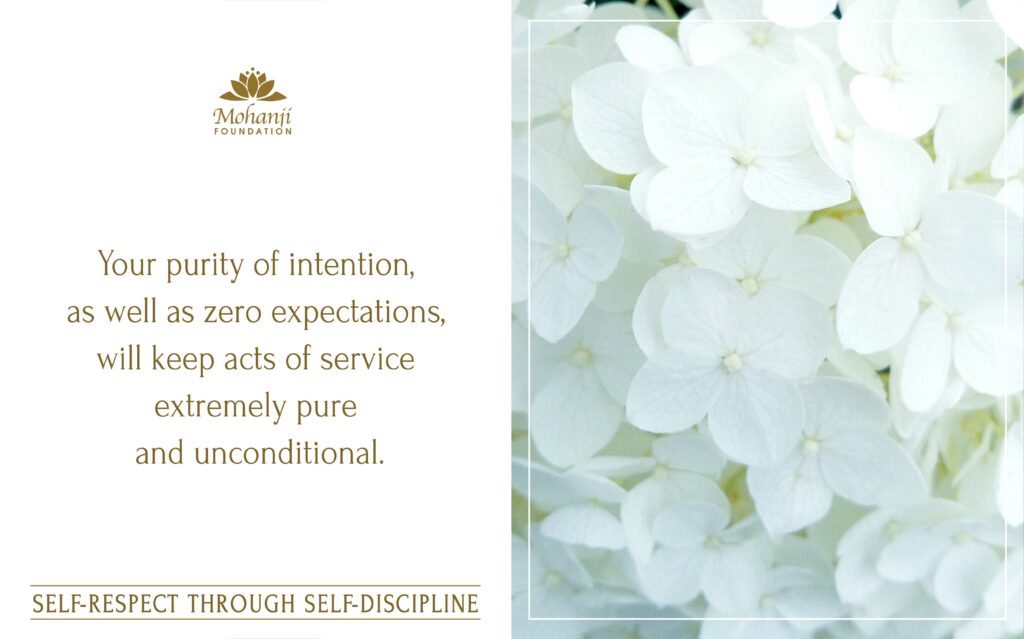
If you are hungry, you have food that makes you satisfied for some time. That’s an experience of contentment, but we are always chasing something, trying to acquire something – power, position, money and at the end of the day, we die empty-handed. We go empty-handed. I’m not saying everything is bad. You can attain anything, whatever you want to attain. That’s a personal thing.
At the end of the day, if you don’t have contentment, imagine a very, very rich person who cannot sleep peacefully. That’s not of any value. But maybe a very poor person might be sleeping peacefully, contented with what he has.
The value is your personal contentment, personal peace, and personal happiness. That’s the value. Whatever we attain in the world sums up how much we enjoy it and how much we experience it. Experience is the only earning of a lifetime – every moment experience, variety of experiences each day. What we save are our memories. Our savings are only memories. We cannot save anything which we can take when we go, but we can afford to have great memories. That’s our real savings.
Our expenses are our expressions. What we express into this world – if we are expressing selfishness, greed, anger, hatred, or jealousy, it’s not going to get us any kind of respect or support. If the world has to love you, you’ve to express selflessness, unconditional love, non–violence, and things like that. If you’ve to express those, you’ve to cultivate them inside. You cannot express anything which you don’t have.
We are knowingly or unknowingly only expressing what we are in this world. Even if we try to mask it or hide it, at the end of the day, what we express in the world is what we are. We think that people don’t understand. People understand. People do watch; they understand. That’s how respect comes. Respect happens when we consistently express unconditionality.
Imagine – we live for the world; the world lives for you. What you sow, that you’ll reap. This is how life works. These fundamental things are forgotten in the mad rush for something. That’s what I’m telling people. “You have everything you want inside.”
If you start feeling abundance, abundance comes to you. The secret of success and wealth is this abundance; you should feel abundance inside. We were with a charity group now in Bar, ‘The women of Bar’ (Žene Bara). They’re doing great work. Last year we went there, and we supported them as we could. This year also we went there, so they were telling me something which really touched me.
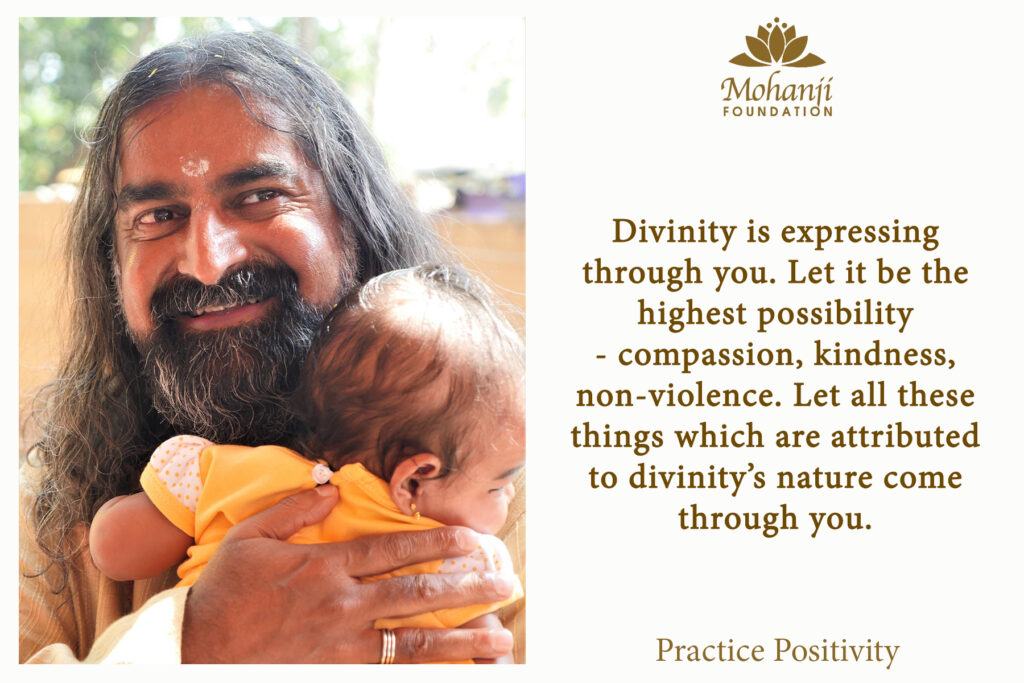
Between last year and this year, the number of recipients has increased. I asked them if this was because of COVID. Also, one of the things which surprised me. It’s not a surprise, actually; it’s everywhere in the world. It’s not only connected to Montenegro.
There are divorces – more separations. Actually, there are women who end up with children. So, children have to be taken care of, and women have to survive. Plus, some of them have diseases and ailments, and there’s no support from the man. In another way also, probably the man is ill, and there’s no support.
Whichever way it is, you see, there’s no backup or kind of integrated thing happening at the family level because, most of the time, we are not looking at what we can achieve together. We are looking at what individuals can do, and we always see conflicts. Conflict separates.
Our responsibility is to share
Host: Is this why you often stress the importance of charity work, the importance of service, so to speak?
Mohanji: I stressed the value of charity work because it’s our responsibility to share. We all have something in abundance. Take the eight billion people on the earth. All of them have something in abundance.
For example, some people have a lot of time in abundance. Some people have skills or experience in abundance. Some people have money. Money is not everything. Everybody has something. When you share that as a responsibility to society, that society becomes richer. I’m talking about charity work, not as a favour to anybody but as a responsibility.
I always tell one thing, “When you’re holding the passport of a country, you should talk about responsibility towards that country. What have you given to the country?” We all talk about rights. Everywhere you go, people talk about rights. We elect certain people to governments, then we start stressing them for our rights. Instead, why don’t we just work on responsibility? That makes you richer, the country richer, society more balanced, and also the government can rule peacefully.
Host: Could we say along these lines that charity work actually purifies us?
Mohanji: Absolutely, 100%. Not only does it purify, but it also strengthens us. Imagine you want very little from the earth; you’re like an emperor. You’ll feel like a monarch because you hardly need anything from the world. When you need a lot of things from the world, you’re always looking for something to get from here; you always feel like a beggar. It doesn’t matter how much money we have.
If you see, a lot of rich people in the world are very poor at heart. They only have money. They are scared that, “If this all goes away, what’ll happen to me?” I believe that you can have much more richness by winning hearts by doing something for the world – giving something which you have or sharing something with the world. It really increases your level of purity. The fewer you have dependencies, the freer you are. Freedom is our choice. Your testing stone is yourself.
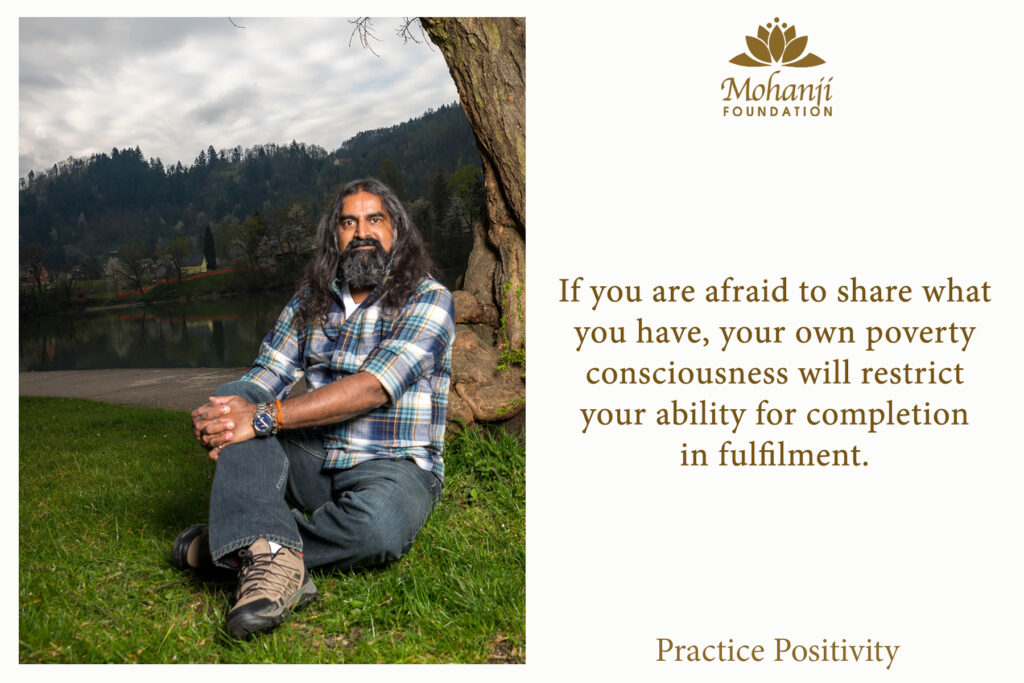
Don’t let dependencies lead the way
Host: Yes, I remember you addressed this in your book. You actually wrote that dependencies and expectations are the main challenges we all face in our lives. Why is that so?
Mohanji: That actually has a lot to do with our education system. Our education system is only making us live a life. It’s preparing us to get a job, but our education system should always be connected to who we are.
If a child realizes, “I am a unique being. I have great relevance on earth. I am walking, talking, I’m doing things, and this is all connected to the energy inside me. What expands me is when I share, or what I share expands me. What I try to hold, my selfishness contracts me; it makes me feel lesser.” This is the education that we should give to children. What we are telling children is how to get a job.
Our whole system is focused on somehow making a living, not being the life. If you’ve to be a ruler of your life, you’ve to know who you are. You need to study the manual of life. That’s not taught in the world. I’m not talking about Montenegro specifically. In the world, that education isn’t there. Then we focus on religion, but are you satisfied with yourself?
Then you follow any religion, you’ll have a greater connection. You’ll understand what Jesus speaks. You’ll understand what Prophet Mohammed speaks. You’ll understand what the Buddha says. All these you’ll easily understand when you know yourself. Everything should be there to stabilize you.
When you’re really stable, your family is stable, your society is stable, and the country is stable. My attempt is to create stable people, and to a great extent, I’ve succeeded. That’s why we are on six continents now. Society really needs it. Probably that’s why people are coming; 200 people came here. They know where they’re going.
I always tell them, “Don’t follow me without questioning because questions should be asked. Never ever blindly follow anything in life. Not only spirituality, but I’m also talking about life. What you follow, you should feel. Is this true for you? Do you resonate with it? Is it making any sense? Never ever follow anything because somebody else is following.”
“Maybe that person has a reason. You may not have the same reason. So, analyze, and understand yourself. When you say, ‘Okay, this is real; this will make me more stable’, your testing stone is yourself – your stability, your rate of success. Simply put, whatever happens in society, it never tilts you, never shakes you. It doesn’t shake you. You’re cool with whatever is happening in society. That shows how far you have reached inside. What you take in becomes you.”
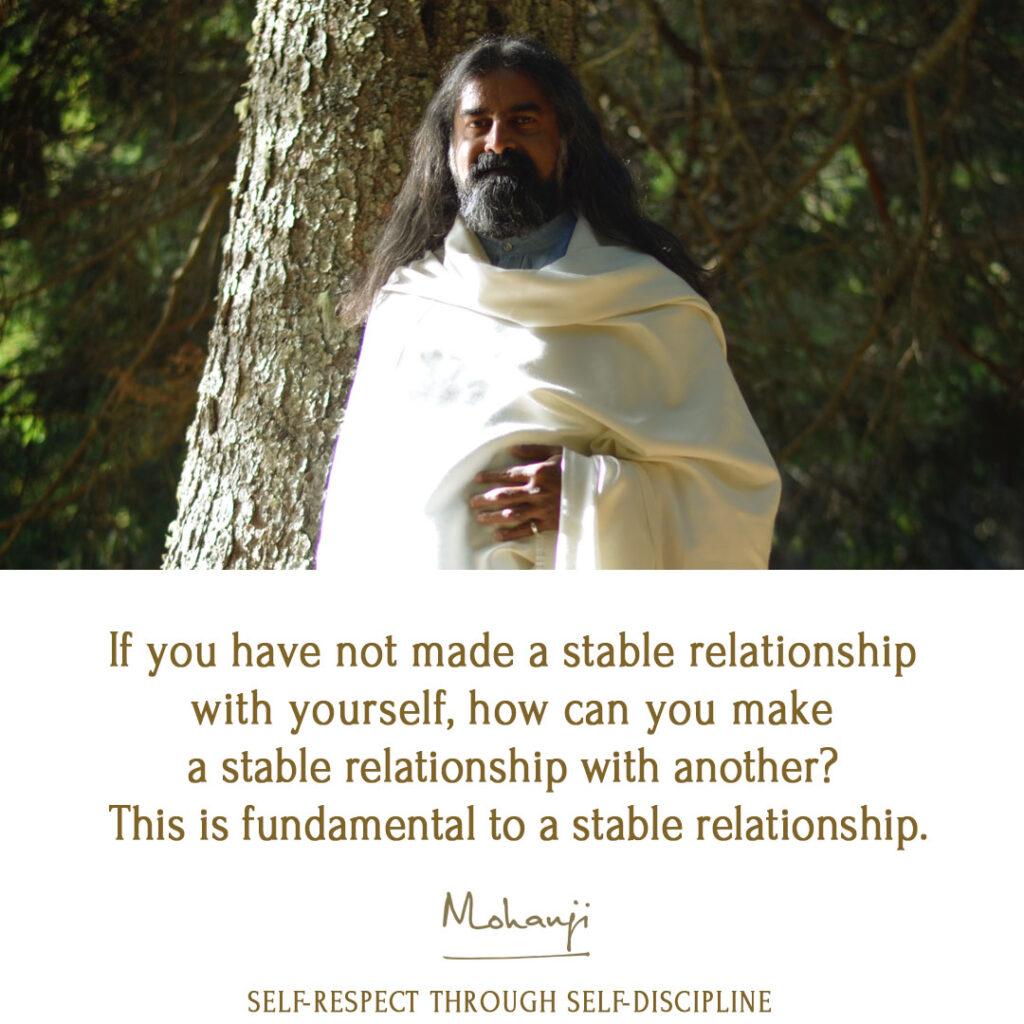
Inner peace and happiness
Host: We all have moments when we don’t react to the outer world, no matter what’s going on. I must say that actually experiencing peace in the middle of external turmoil is very empowering, but those moments don’t last; they pass. My question for you is: How can we make this inner peace, this inner stability, more lasting and more sustainable?
Mohanji: The first point you said, I think the answer lies in the question. Why are we not having continuous happiness? That’s because we are connecting our happiness with things outside. Our happiness isn’t connected to what’s inside. There’s an expectation for sure.
If somebody smiles at you, you feel happy. If they don’t smile at you, you feel sad. So, everything is linked to something outside. We pin our happiness on something outside. The fundamental is that you should be contented inside. Outside are all tests to prove that you’re inside.
I’ll give you one example. Even though it’s a bit funny example, it tells a story. Buddha used to give sermons. When he was sitting and giving sermons, a lot of people used to come, like Jesus used to give sermons and a lot of people used to come to him.
Similarly, he was sitting and giving sermons, and one person came up to him and abused him, called him all sorts of names and said, “You are actually spoiling the people”, all things negative. His disciples, who got very angry, almost got up to beat him up, but Buddha said, “No, sit down. Don’t do anything.” He heard the whole thing. When this guy was venting, Buddha heard everything, and then he went away. (This guy who was scolding him went away.)
The disciples asked him, “Why were you silent? He was abusing you so badly. Why did you keep quiet?” Buddha said, “No, no, you didn’t understand. This was a test for me to whether I was living my teachings. Don’t react; instead, respond. So, if I wasn’t affected, whatever he said, it goes back to him. I’m not buying it. I’m not taking it. What he said, what he thought, what he believed I am – it all stays with him. I’m not affected. This was a test for me whether I’ll be affected or if I’m going to buy that.”
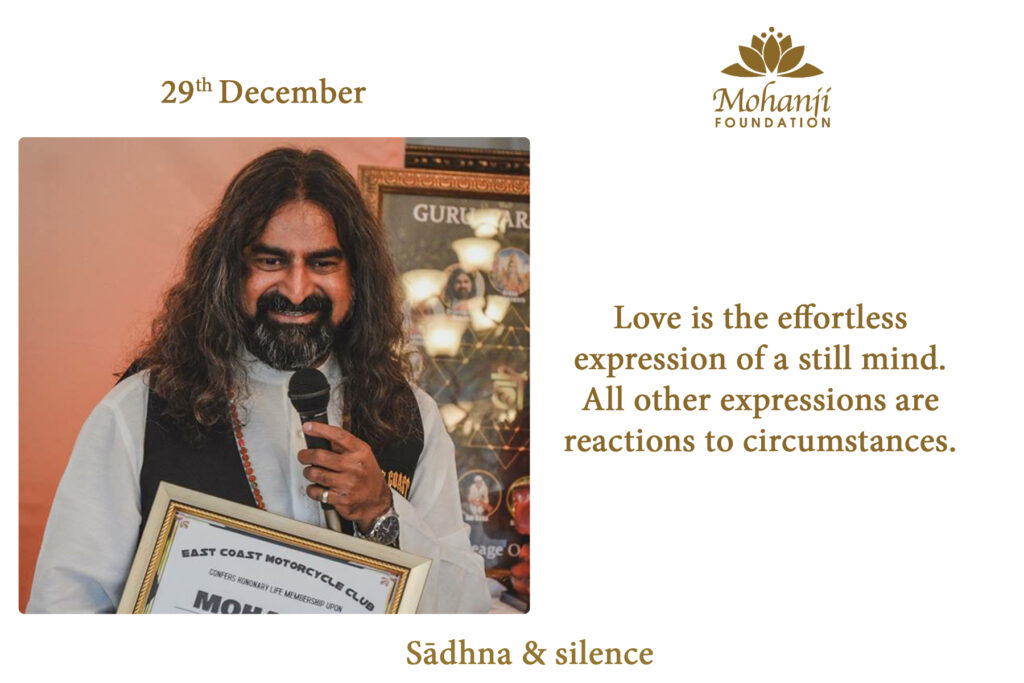
This is exactly the fundamental here. We buy everything. If somebody says something, we immediately take it on, and then we put it into our life. We become very upset and sad. But at the same time, it’s sitting with somebody; leave it there.
There are two things we can actually use effectively in life. One is responding – response means using your brain. Imagine somebody calls you a donkey. You simply think maybe he can’t see well, so he thinks I am a donkey. That becomes funny.
The second thing is that we can opt for silence. In some cases, silence is very powerful. Somebody is really arguing with you, especially in the office; it happens. Somebody is really upset and arguing. You just sit quietly and watch them, not getting affected.
After the argument happens, then comes a discussion like, “Can we do something about it?” But when the argument happens itself, we react – reaction means from the emotion. The reaction is always from emotions or ego. Arguments never solve things. It aggravates and goes into another argument. But the discussion is the right maturity; it’s a sign of maturity.
Sometimes before a discussion, there’s an argument. What you take in becomes you. It comes into you, and it starts behaving through you, or it starts working through you. There’s a poetry, which, in translation, says, “When you buy devils, you’ve to handle them also.” Not devils per se, not evil, but devils mean these problems from the world. If you’re buying them, then you’ve to take care of them. If you don’t buy them, it sits in the shop.
Cycle of desire and experience
Host: As long as we’re not buying devils, as long as we are in this non-reactive state, as long as we are in silence, we are out of trouble. But how can we achieve this state? This deep silence, as you call it.
Mohanji: Silence means lack of thoughts – no thoughts inside. Where are thoughts coming from? Desires. When you have desires, you have a thought, and the next level is expression. For example, you have a desire for coffee. You have a thought,” I shall have a coffee.” Next would be, “Can I have a coffee?” and then finally, you have a coffee. This is the cycle of desire – thought, expression, action, experience, memory, and desire.
Again, the cycle goes on. This is how life works. This is how our life goes. That leaves an experience. Experience is stored as a memory. That memory leads to further desires. This is the cycle with which we live. We are rotating in the cycle.
The second stage – what happens is you do have a desire, but you don’t really care about the experience. You don’t really need it. You’re watching the thought. You already took a step backwards, not like getting, plunging, taking a dive into it. Thought happens, but you don’t sometimes express it. What happens when you consistently don’t express it – your thoughts become weaker. Because you’re not fulfilling them, the level of peace of mind becomes longer. You become more observant rather than reactive or plunging into life.
The third level is that because thoughts are not happening, the whole mind structure changes because you become completely peaceful because thoughts are not bothering you. If you get a coffee, you are happy. If you don’t get a coffee, you are happy, which means everything is okay. Acceptance level increases.
When the acceptance level increases, your mind structure changes. It’s like the pillars. The pillars are thoughts holding the mind. When pillars start collapsing, the mind itself collapses. Then what happens? The pure you – what you are minus your position in society, minus your possessions, whatever you’ve earned from society and minus your relations.
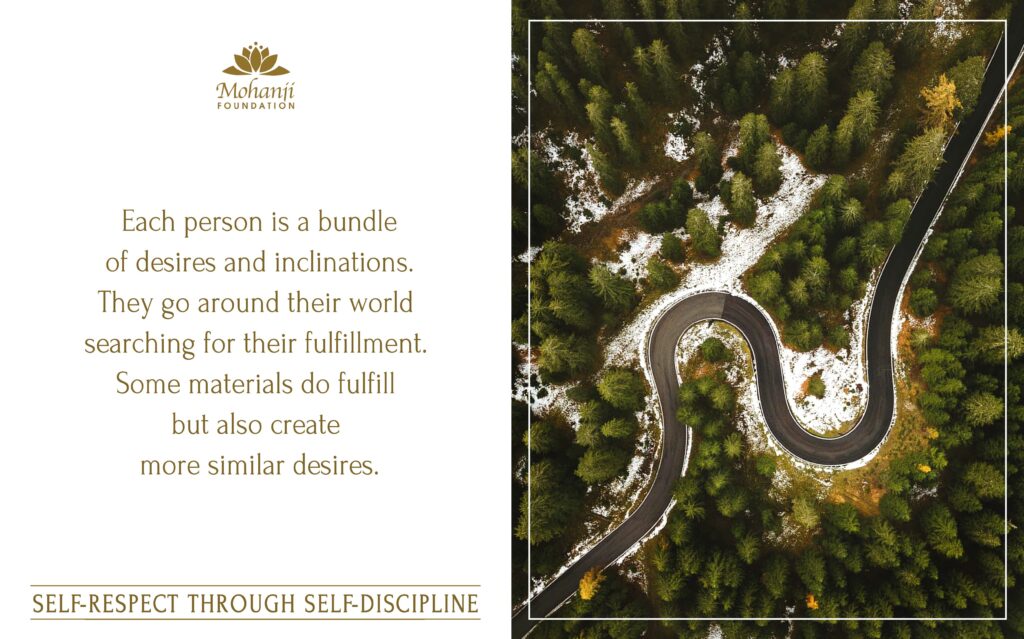
Pure you becomes more and more evident. That’s what we call great masters and saints. Their operating level is pure. Their desire level is zero from society. What do they give to society? Themselves – as pure as it gets. How do you know that you’ve attained that purity? Thousands of people will come to you. They come to you because you need nothing from them. You become really, really effective in the world. The effectiveness happens when your dependencies reduce.
Mostly we want so many things; that’s why we’re working. We are always in a mode where we are ineffective to some extent. We could be very skilled. We know how to use our skills as well, but we get in measures. Imagine you’re a CEO; you get this particular salary. It’s like that, but here there’s no measure anymore. You are the world. The world is yours.
Everything comes to you, and the measure changes. So, this whole cycle, I told, there are a few more steps actually – then you go into deeper silence and stuff like that. Then you become a presence eventually. It happens when personality dissolves. Personality is what you project. That changes. You become like a mirror because you don’t need anything from anybody. When somebody comes to you, you’ll reflect them, not you. You become a great master. It’s mastery. That kind of thing happens.
That’s why Socrates said, “Even if I show myself fully, they can’t see me. So, instead of drinking poison every day a little bit from society, I might drink it together.” He said that because people don’t understand you. Jesus wasn’t understood. Buddha wasn’t understood in his time. Krishna wasn’t understood in his time. They were all free. They were born free. They lived free. Freedom isn’t understandable to a bound society.
The meaning of detachment in attachment
Host: As you are talking about freedom, let me read a short quote from your book ‘The Power of purity’, where you, among other things, say that ‘Detachment within attachment is the path of liberation, the path of freedom.’ What did you mean by this?
Mohanji: Detachment simply means even if you have a thing or not, you’re still fine. I’ll use the example of coffee. It’s easy to understand. Imagine I need a coffee. If I have a coffee, I’ll be happy. If I don’t get a coffee also, I’m happy. That’s detachment while you have the attachment. It means you’d like to have a coffee, and you are told this also, but they say this coffee is over. No problem.
You don’t suffer. You don’t have a headache, or the reactions are not in the body. That’s what I meant to say. Detachment simply means nothing outside binds you. You are free. This is why I said during COVID time, so many people went through a series of depressive states. That’s because their usual freedom, which is connected to materials, places, or people, didn’t happen.
What happened was restrictions of various types, like you can’t even hug somebody or touch somebody, so they went through a crisis. But I said that’s a big training for you on how to depend on yourself.
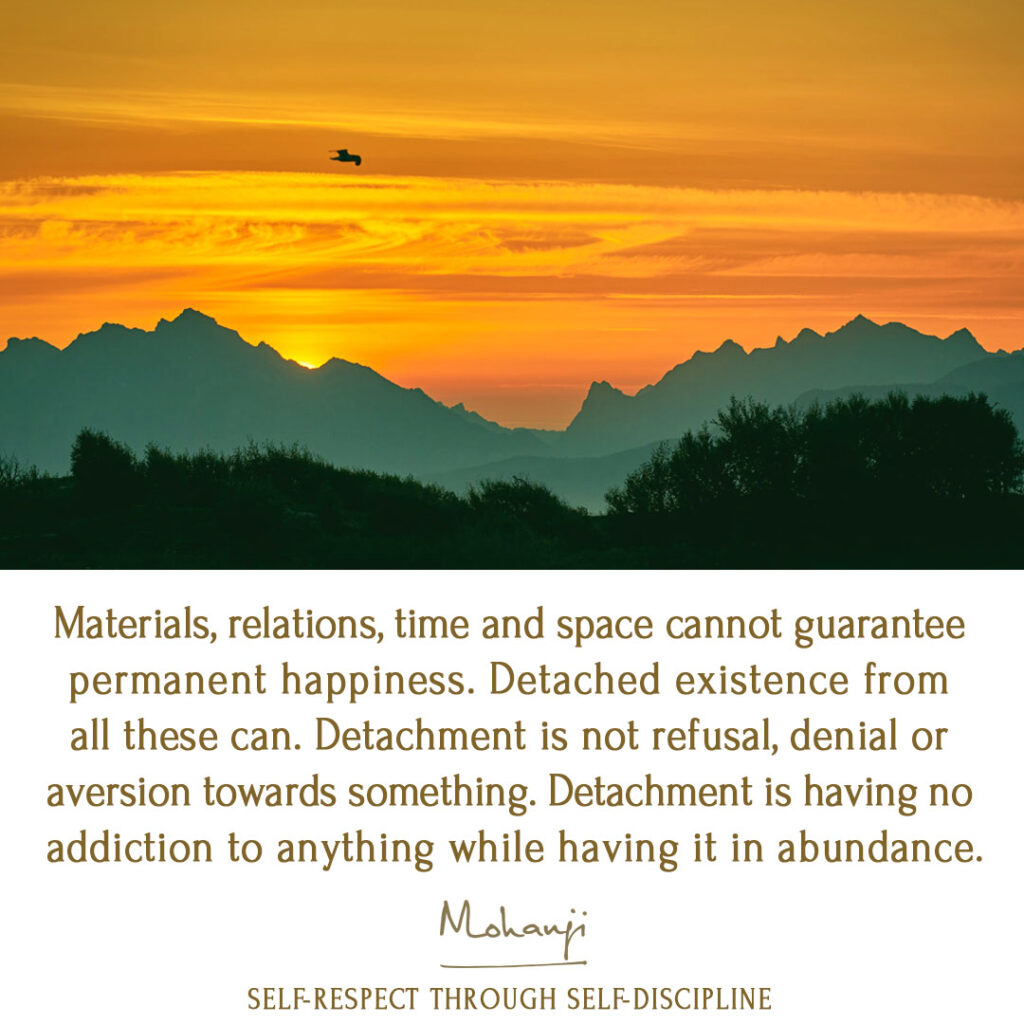
Success is in contentment
Host: You’ve just mentioned the Corona crisis. Apart from different restrictions, it also brought us an increased awareness of our own mortality. I guess it’s natural that we are afraid of death. Sometimes, we are even afraid of change. But my question is: How can this death awareness, this awareness that everything is temporary, us included, how can it help us rather than scare us?
Mohanji: The thing is our connection to our personality. What are we projecting to the world? Our personality. People recognize us by our personality – the name, the form, the way we talk, and we do things. That’s how society looks at us. We are struggling to maintain it always. The entire lifetime, we try to maintain our personality. So that personality’s death is what we are afraid of.
That’s why people try to look younger and all these things. You know, they colour their hair, all the things that are connected to maintaining a personality. Exactly that’s what we are worried about in life. But imagine you are in acceptance of the changes. Most of these fears will go. Many of these fears will go.
We are evolving, and while we are evolving, we are accepting things as they happen. This we see in animals, cats and dogs (stray ones); sometimes, they get injured. It’ll cry when there’s pain, but soon it’ll lick the wounds and start its life. It’ll not sit down and complain long, and they heal fast.
We have the same ability as any animal to heal ourselves, but the healing doesn’t happen because we don’t allow it. We resist it. We complain, criticize, and we blame somebody for our thing. So in the whole bargain, we make a lot of emotional mess.
As we said, in every state, there are fears trapped inside, which are connected to our personality. If we are born, we’ll die. These two boundaries we cannot change. One is birth, one is death, and we don’t know when. Like we fall into sleep, we fall into death. When there’s energy inside our body, we call it life. When the energy leaves our body, we call it death. Both are inevitable.
While we are living, the best earnings are great memories because that’s the only savings we have. To have great memories, we need to have great relationships. We don’t even care for relationships in life. The secrets to relationships are two things: one is that we should care genuinely. The second is that we should incorporate freedom into it.
If you want to maintain any relationship, the main segment/cement should be freedom, especially husband – wife – children. Freedom doesn’t mean that you can do anything you like; that’s not the thing. That’s a lack of discipline. Freedom means you accept another individual as an individual, not as somebody to you. A child should be another individual, and we respect the child as a potential leader of society tomorrow.
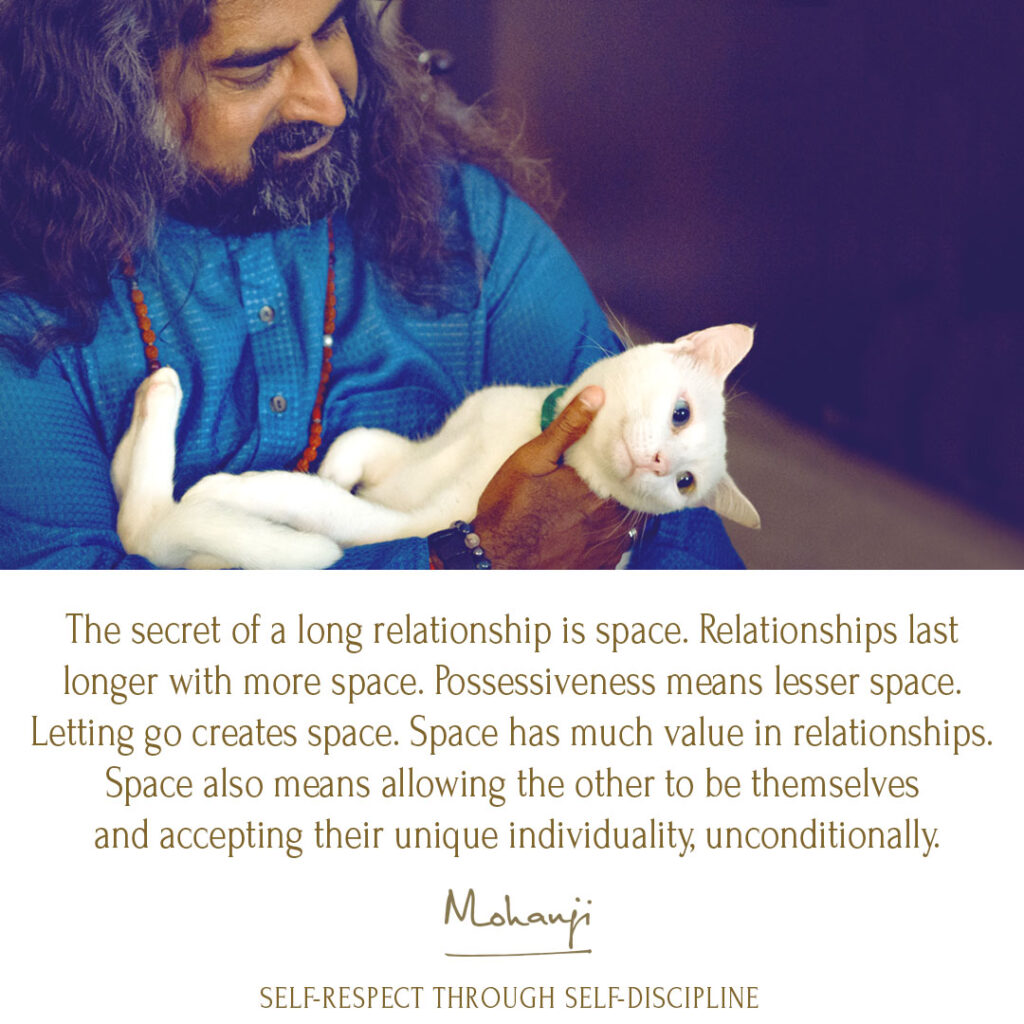
The child will prosper; he’ll feel strengthened. But the moment you start treating it, saying, “You are a child. This isn’t good. Look at that child; he’s better.” That’s not good; then you are finished. Comparison diminishes individuality. Our way of life and our lifestyle tells a lot about how mature we are.
We can have a great society, a great country. Just respect; one word – respect.You can nurture children as potential leaders of society just by telling them or making them understand they are unique. Avoid comparing, avoid competitions, and avoid imitations. The person will grow up as they are. When they grow up, they’ll be really independent, and individualistic, self-sufficient. We can create such a society. It isn’t impossible, but the moment competition comes, comparisons come, and everything goes down.
Success is not in winning examinations. Success is in contentment. Are you content at each point in time? Otherwise, when will you be contented? If we don’t care about our daily life, which part of our life will we be happy about?
Your stability should speak
Host: When we raise our children with this pressure, if we put our expectations on them, if we constantly compare them with other children, we actually underestimate their uniqueness. Is this why many adults are actually ending up attending your ‘Be You’ program, where uniqueness is appreciated? What is the ‘Be You’ program about?
Mohanji: Yes, we have a particular program. Now, I’m doing the ‘Empowered’ program. I’m trying to create masters. What’s the use of having followers? Anybody can follow anybody. Even if you don’t know the person, I like this person. Many people follow rock stars, film stars, etc. Following you can never guarantee; it’s a mind game. But I believe that if somebody comes to me, their stability should speak. They become more stable and more themselves. I want to see them independent.
There’s this famous story of a farmer and a cow. The cow belongs to the farmer. The farmer has tied a rope around the neck of the cow and is holding the rope because the farmer is afraid the cow will run away. The cow wants to go, and the farmer also cannot go because he’s holding the cow. So, both are stuck. This is the life of most people in the world. We are either the farmer or the cow. This isn’t life.
Life has to be experienced each moment. We have taken birth anyway. What are we doing with life? This question should be asked. It’s not about spirituality. People unnecessarily use spirituality for everything. It’s about you. What have you got out of this life? Imagine it’s like a house or even a yacht or whatever you want. But the point is that you raise yourself to the deserving level. You should deserve it. Where you are not in poverty inside, and you raise yourself to the level of deserving, everything comes to you.
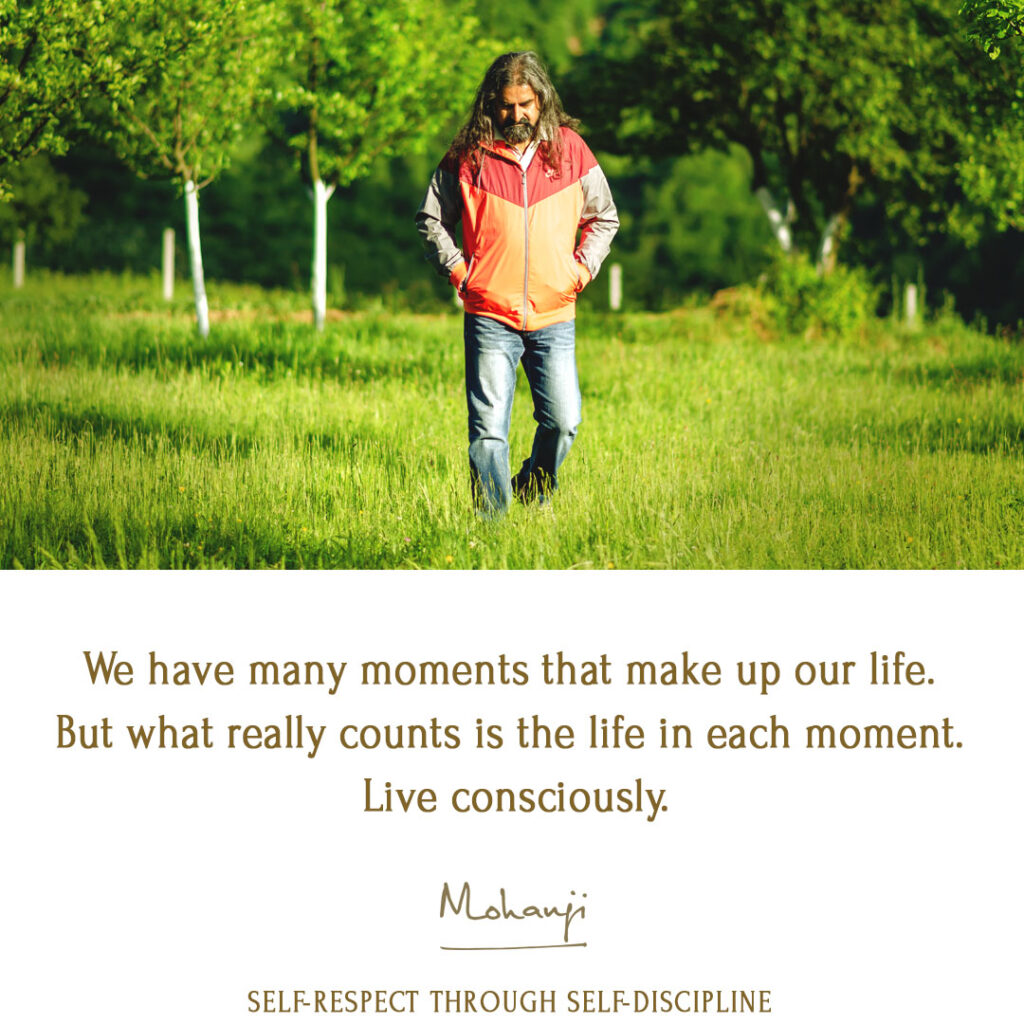
Most of the things in life come to you when your frequency shifts. We are all frequencies. Some people refuse to rise to a frequency, maybe because of upbringing, education, society, religion, or whatever. But the point is, how much have you experienced it? I look at life as experiencing everything you want from life. Let it all be so that your life is full and complete. If you’re afraid of experiencing life, a lifetime is wasted.
Pain is an eye-opener
Host: Many people walking on the spiritual path share that the main catalyst or at least one of the main catalysts for change is often suffering. It seems that we are only willing to evolve after we’ve suffered a lot. Why is that so?
Mohanji: It’s an eye-opener. Usually, suffering opens your eyes. The root cause of suffering is resistance. If acceptance happens, suffering doesn’t happen. Pain will be there connected to situations, but suffering is connected to resistance.
Like there was this boy, I think you would’ve seen on social media. He died at the age of 27 or something; he had cancer from the age of 14. But the moment social media came, he was inspiring many cancer patients to have a cheerful life, and because of that, many people recovered. He was in the hospital most of the time, but he used social media – Instagram or these other things to cheer up people.
When he died, the entire world or so many people mourned because this man’s value addition to life was unbelievable despite his pains. So, suffering is actually our choice. We can choose to suffer, or we can say, “Okay, this is happening to me.”
For me, especially when my daughter passed away in a road accident, I asked one question, “Why didn’t I die?” I was already in my 30s; I had lived my life already. She was not even five years old. Why did she go? Why couldn’t I go? But there’s no ‘why’ in life. There’s no reason or what can you say – the reason? We can blame somebody for that but that doesn’t solve the matter. She’s gone. I can’t get her back.
I was in pain for sure, but I refused to accept their sympathies. People come to you, “Oh, I’m very sorry. I’m sorry. This happened.” What happens with sympathy? It paralyzes you. You’re already in sorrow. When so many people come and tell you, ”I’m sorry. Poor you.”, what happens is our complete initiative dies. We’ll become more and more and more helpless and sinking.
I went away from that place after the completion of the rituals. I didn’t stay there, and I decided one thing – I’ll not have self-pity or sympathy. This happened in life. I don’t want to know the cause; the cause isn’t important. A situation happens; its effect is important. I understood; I changed the pain to a purpose.
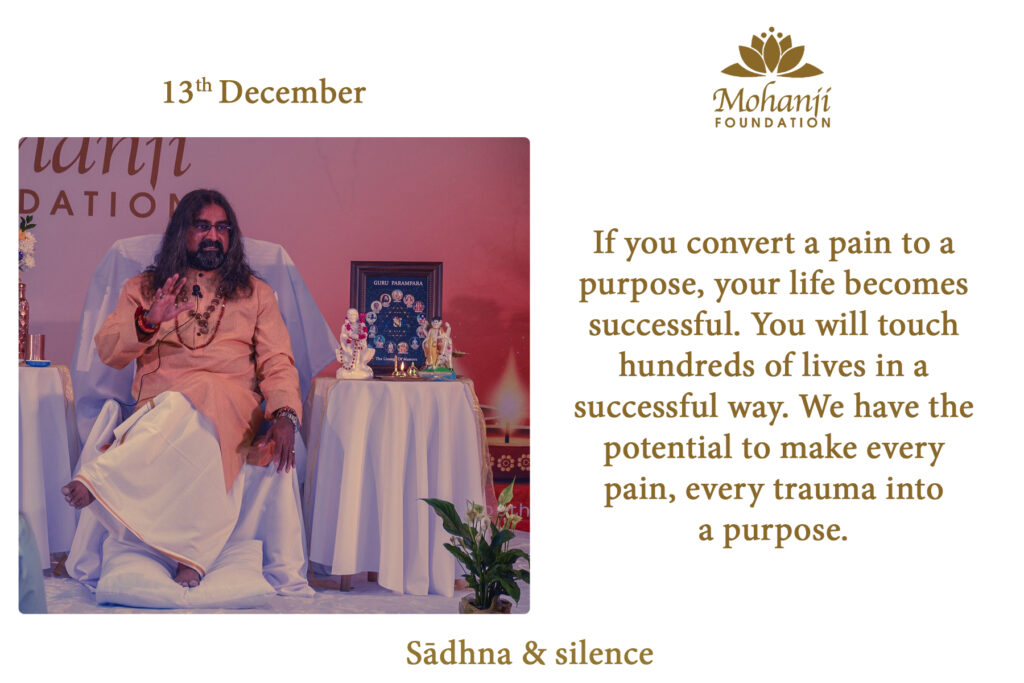
Today we are in 21 countries, touching many lives. On the T- shirt, it’s a picture of my daughter. She lives through many, many people, touching many lives, so many charity activities. We can convert any pain into a purpose. Otherwise, what’s the next option? I’ll be suffering. I’ll be continuously drinking alcohol or ruining myself, but what’s the use for the world then? So, pains are given in life as an eye-opener.
Look here, you can choose this pain, and these are compelling pains. With these pains, you can’t say, “I want it in a diluted version.” It’s like a hard hit – that means it tilts you completely; it throws you off balance. This is not the only thing.
Soon after my daughter died, I lost my job. I had savings, so I invested in a building. I thought I’ll have a flat. That builder ran away with the money. Then I had a full-fledged house, and I decided to shift my materials to my home town, and I kept it in the house because I didn’t have a house. I was waiting for this builder to build a house, which never happened. This was stolen.
People broke open into the house and systematically took away many materials. At one point in time, I had a full family. Then, of course, I divorced my first wife. So, I had a full family, my child, my wife, my materials, my household materials, possessions, money, and my job – all gone; from one point of having everything to another point of having zero. It’s almost like I’m beginning my life. That was a time when I learned the best lessons of life.
Even if you call somebody, some friends, they won’t pick up your call. They wouldn’t call you back because they think that this man wants something. So, I really understood the friendship. Then later, I got a job, another job as a CEO of a company; all these people came back.
Attitude is important
I didn’t have a job for about six months to eight months. At that time, all the people went away. Then everybody came back. I had a time when there was only one meal a day because I had no money. I didn’t tell anybody. I didn’t complain. I just had one meal, and the rest of the time, I drank water.
That was the only money I could afford at that time. So, every situation was simultaneously happening – my daughter died and everything; it’s not like one hit. Hit after hit – one after the other. Then today, what I talk to people is from my practical experiences. I’ve seen it all; I experienced it all.
Life gave me enough and more lessons. What I speak today has the smell or the scent of the experiences. I’m not talking from books. What I speak is from my life. One thing I tell people is, “You can be a phoenix anytime. Just take a decision.” One thing in life you can never forget or never ever should forget is attitude. You should believe that you can do it. It’s not about spirituality. It’s not about people outside. It’s about you. You believe. See, “I’m unique. I’m authentic. I can be authentic.”
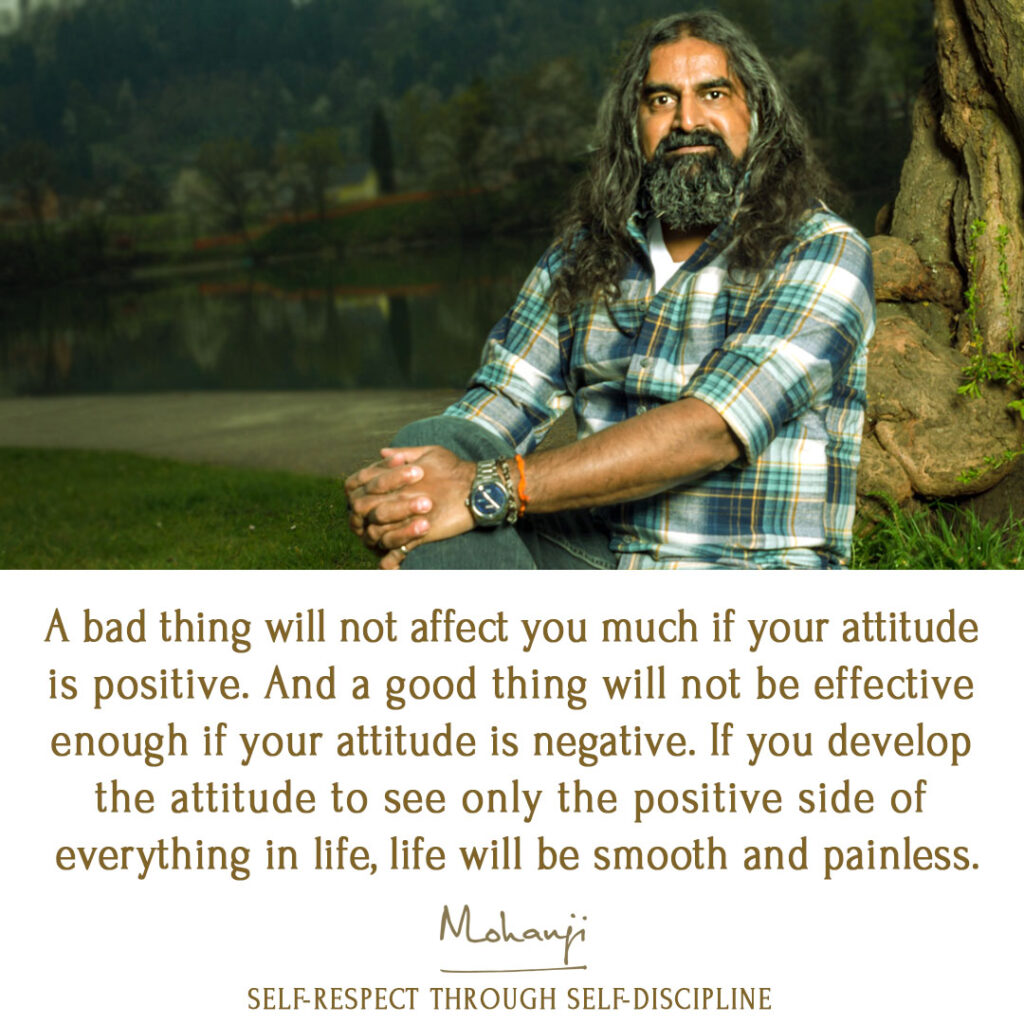
People may try to pull you down. They may not appreciate you; they may discard you. Society can only do two things; either they like you, or they don’t like you. They love you or hate you. Both are okay. If our dependency on society isn’t strong, we can survive anything because I’ve seen a complete lack of acceptance and complete acceptance. Both I’ve seen – when I had the position, the power.
For twenty-two years, I worked in the corporate world, starting as a sales executive, a junior position. I ended up as the country head and CEO. So, in about 22 years, not even 22. By 35, I was the head of a country which is usually for 50 years plus people. I really worked hard. All these years, I saw these two sides. Mohanji, plus the company, is valuable. Mohanji minus the organization – zero value. Today Mohanji as an individual has value.
But the problem, the position, and the profession always add it up. So, one thing is sure – your position is temporary. You are not temporary. Like there’s a saying, “If you are born in fire, no sun can burn you.” This capacity is in us; all of us have it. Sometimes pains open it up for you where you’ve no choice. Your only choice is survival. What do you do? It opens up in you. Then you become like a lion.
I always like to remember the lion. The lion is not the fastest animal in the forest, nor the strongest, nor the largest, but when a lion comes in contact with an elephant, the elephant shivers. “A lion has come!” Attitude – a lion behaves like a lion. The elephant is huge. It can just kill the lion or just throw him away, but the elephant thinks twice. “The lion has come.” It’s in the eyes; it’s in the attitude.
You got to look at life in the eyes and believe in yourself. That’s the bottom line. That’s ‘being you.’ That’s what being you is called. You can’t be anybody else. Please remember. Society is sometimes very cruel. The moment you fall down, it’ll climb on you. You got to get up, whatever it matters. Life gives you those opportunities. We got to catch them and move forward.
The video of the interview is here.
Transcribed by Nada Raković
Proofread by Padmini Ravi Kumar and Seema Jamakhandi

